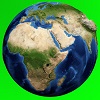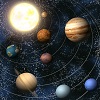IPad Apps

Rocks and Minerals

Structure of earth

Simple Machines

Magnets

Animal Adaptations

Plant Adaptations

Diseases

Solar System
Welcome to FunAppSchool

IPad and IPhone Apps
Educational Games for IPad and IPhone. English Grammar and Science Apps for Elementary and Middle School Kids.
Radio
The radio is the result of two other amazing inventions before it; the telegraph and the telephone. Both these instruments led the way for the radio later on.
While the telegraph and telephone were great devices, they were limited in that they could only communicate with another such machine only if it was connected by a cable.
The invention of the radio made it possible to communicate through transmission, to any place using wireless telegraphy.
The discovery of radio waves (electro-magnetic waves that are able to transmit music, speech, pictures or anything else through the air), coupled with improved technology of the telegraph and telephone was the birth of the radio.
Italian inventor Guglielmo Marconi in 1895 sent and received the first radio signal. A few years later he successfully transmitted the first wireless signal across sea.
The problem with Marconi’s wireless transmission was that it only transmitted signals. It could not transmit sounds over the air like the radio does today.
Four years before Marconi’s invention, another inventor, Nikola Tesla had successfully invented a theoretical model of the radio.
He disagreed with Marconi’s invention and upon a court ruling; Tesla was given the title as the inventor of the radio.
There were a few other ‘battles’ over who invented the radio with different scientists claiming they did. However, Nikola Tesla is historically considered to be its inventor.
After the sinking of the Titanic was notified by radio communications to land, the radio became increasingly more popular.
By the early 1920s radio broadcasting was born in America, and later FM frequency radio, internet radio (which used the internet to stream radio programs from around the world), and satellite radio were introduced to the world.
Besides the great scientists mentioned here, others such as Hans Christian Orsted, Michael Faraday, James Maxwell, and Heinrich Rudolf Hertz contributed greatly to the birth of the radio through their own individual inventions and discoveries.







